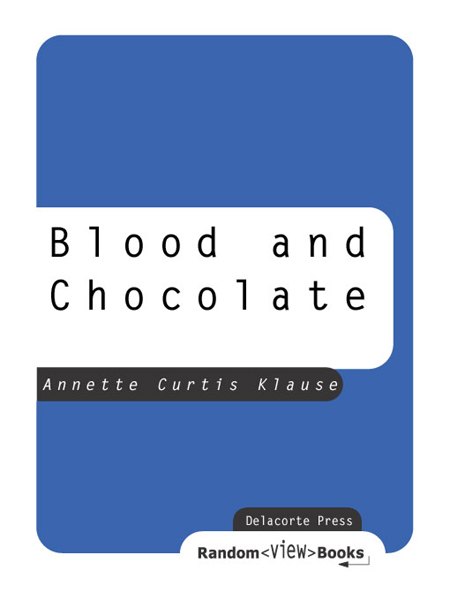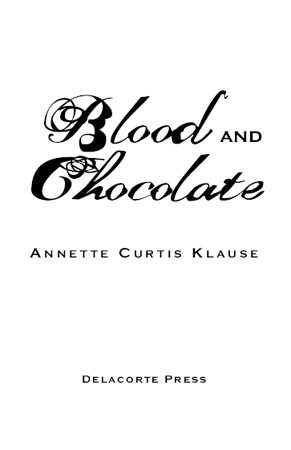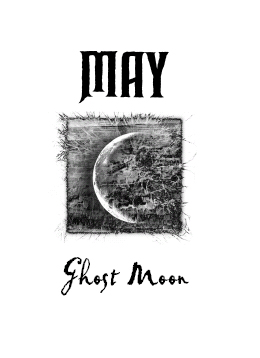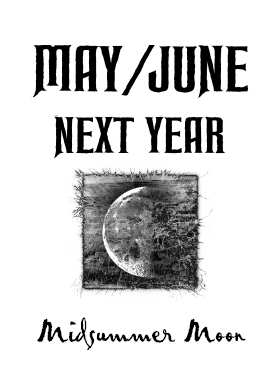Blood and Chocolate


A book for Mummy, although I'm sure she'd
prefer cuddly, polite creatures.
Ye may kill for youselves, and your mates, and your cubs as they need, and ye can;
But kill not for pleasure of killing, and
seven times never kill Man!
Rudyard Kipling, “The Law of the Jungle”
In fear I hurried this way and that. I had the taste of blood and chocolate in my mouth, the one as hateful as the other.
Hermann Hesse,
Steppenwolf

Flames shot high, turning the night lurid with carnival light. Sparks took the place of stars. The century-old inn was a silhouette fronting hell, as everything Vivian knew was consumed in fire.
Two figures broke from the smashed front door and ran toward the woods where she stood, their nightclothes smeared with soot, their faces white with terror. The person who pushed them out disappeared once more inside. Another window exploded.
Three of the cottages were in flames, too, and the barn. Horses screamed in terror as they were chased from the stables by a handful of teenage boys.
In the West Virginia hills, miles from the nearest town, they didn't expect a fire engine to arrive.
Somewhere behind her a woman wailed and wailed. “They did it on purpose. They burned us out.”
“Get her into one of the trucks,” a male voice yelled. “I'm bringing the other car around.”
“Watch out for snipers,” a female voice called back. “They might be waiting to pick us off as we leave.”
“Head for Maryland,” Vivian heard her mother say. “We'll meet at Rudy's.”
Vivian felt a tug on her arm. Her mother, Esmé, stood panting beside her. “I put Aunt Persia in my car. Where's your father?” Now that she stood alone with her daughter, her voice rose high in panic.
“He went back in,” Vivian answered, her words roughened by smoke and tears. “With Gabriel and Bucky.”
“Ivan!” Esmé started toward the building and Vivian grabbed her and held on tight. “No! You can't both be in there. I can't stand it.”
Esmé fought to get away, but at fifteen, Vivian was her match. “You can't stop him,” Vivian said. “He swore to protect the pack.”
“But I need to be beside him,” Esmé begged. “They're my people, too.”
What have I done?
Vivian thought. If only she'd stopped the boys this might not have happened. If only she'd told her father they were out of control.
Figures came around the side of the house. Bucky led a slight young woman not much older than Vivian. Gabriel held a shrieking bundle in his arms.
The fire roared its victory; then, with a crack as if a giant's spine had snapped, a central beam gave way, and the roof collapsed in a peacock tail of sparks and flame.
“Daddy!” Vivian screamed.
But it was too late.
1

“Mom, you've been fighting again.”
Vivian glared at her mother.
Esmé Gandillon lolled in an easy chair, one long slim leg thrown over the arm. She refused to stop grinning. A gash in her cheek still bled slightly.
“You look awful,” Vivian said.
“Yeah, but you should see the other bitch,” Esmé answered. She scratched her scalp luxuriously with both hands, tousling her thick blond hair.
Vivian sighed and came over to dab at her mother's cheek with a tissue grabbed from the box on the coffee table. She would ruin her beautiful face. “Can't you and Astrid leave each other alone?” It had been like this ever since they'd moved here from West Virginia, over a year ago now. She hardly knew her mother anymore. “Can't you?” she repeated.
“Rafe called for you,” Esmé said, ignoring the question.
Vivian rolled her eyes. That was all she needed. Couldn't he take a hint?
Esmé sat up and looked directly at her daughter. “I thought that's where you were, with Rafe and the others.”
“No, I wasn't.” She bristled at the thought. The five young males who were her only age-mates were likely to get the rest of the pack killed if they kept on going the way they were.
“So where were you?”
Vivian turned to leave the room. Since when was her mother so worried about where she was? “Down by the river, at the rocks,” she said over her shoulder.
“What were you doing there?”
“Nothing.”
As she left, Vivian heard her mother growl softly in frustration.
Why did Esmé always have to bring up the Five? Couldn't she get it through her head that Vivian didn't want to be with them?
The familiar knot in her gut formed hard and tight. The fire last year had been the Five's faultâand Axel's. She slammed the door of her room. The inside face of the door was channeled with claw marks. She grew her nails and ripped another row.
Axel had to go and lose it and kill that girl.
Axel had been acting wilder and wilder last spring, and talking crazy stuff. She heard him and the Five boast about midnight visits to town where they stalked humans in the shadows and scared them silly. What they did sounded funny. Vivian made them take her, too. But rumors started going around school. People were getting nervous. When Vivian said maybe they should cool it, Axel and the Five only laughed at her.
Then Axel began to go off by himself, and something seemed wrong to her. He didn't talk as much. It drove her crazy.
I was half in love with Axel,
Vivian thought as she stripped off her leggings.
Rafe thought I was his girl but I would have dropped him in a second for Axel.
She sniffed in disgust.
Caring for Axel made me stupid.
She'd seen their behavior spinning out of control, and she hadn't done a thing. She should have told her father what they'd been up to, even if that meant she'd be in trouble herself. But you didn't squeal on your friends, did you?
Then the night of the Valentine's dance Axel went to town alone and killed a girl in back of the school.
Vivian still felt the heat of anger when she thought of what he'd done. She couldn't help thinking he killed for some petty reason, like the girl turned him down.
And he could have had me,
she thought bitterly.
He must have been changing back when a classmate saw him crouched over the body. Before Axel knew he was there, the boy took off and named him to the police.
The Five decided to help. They killed another girl while Axel was in jail. They didn't let Vivian know their plans; they must have thought she'd object.
And I would have,
she thought, but she wasn't sure.
“How could a boy be covered in fur? How could a human inflict such wounds?” the family lawyer pleaded for Axel. The new killing while Axel was locked up proved there was a wild animal on the loose. Axel had merely discovered the body, then had panicked and run. The case was dismissed.
But someone from town believed the witness's tale of a wolf that turned into a boy, and late one night the inn and outbuildings burst into flame in six different spots, and black acrid smoke hid the moon.
In the 1600s, her ancestors had fled from werewolf hysteria in France to the sparsely settled New World, and by the end of the century had settled in wild Louisiana. In nineteenth-century New Orleans the Verdun triplets broke the ban on human flesh and the pack moved in haste to West Virginia, where they were joined by the remnants of a German pack from Pennsylvania. Last year the forbidden appetite had won again, and the pack took flight from the hills that had been its home for one hundred years and arrived refugees in the Maryland suburbsâfive families plus assorted others crammed into Uncle Rudy's run-down Victorian house in Riverview. With luck, no one would follow them here; they could mark new trails.
The house on Sion Road had emptied out gradually as the others found jobs and places to stay, until it held only Vivian, Esmé, and Uncle Rudy. Vivian had thought that by this time they would have made plans for the future, but now the whole pack seemed to be crazy, her mother included. With more than half of them dead, no one knew his or her place anymore. There was constant squabbling. Survival depended on their blending in while they organized and decided where they would move and settle for good, but at any moment the pack was likely to explode in a ball of flying fur. They needed a leader badly, but no one could agree who.
Blend in,
she thought.
If only I could.
Last summer she had hid in her room and slept mostly, and in the early hours of the morning, the time when wolf-kind come home to shed their pelts, Vivian would hear her mother crying inconsolably by her open bedroom window for someone who would never come home again.
By the time her junior year started, however, Vivian had begun eating almost regularly, and Esmé had found herself a job as a waitress at Tooley's, a local dive. Gradually it wasn't so hard to make it through the day. Vivian was no longer exhausted when she walked in the door at three-thirty, and the schoolwork began to make sense.
She started to look longingly at the groups of kids laughing together around the flagpole after school.
At first she thought,
Why would I make friends with people who would kill me if they knew what I was? What if I give myself away?
But the yearning continued. It was then she realized that she didn't know how to make friends.
She had always had the pack around her, the pack that now hid in their separate dens. There were always pack kids. She had never had to reach out for company, company was always there. The Five were still around, of course, but now she couldn't bear to be with them, and they could never be just her friends now, anyway. They all saw her as a mateâbe nice to one, and the others would sulk and snap. Fight, fight, fight, that's what paying attention to them meant.
I want other friends,
she thought. But no one seemed to want her.
She stood in front of her closet mirror in her T-shirt and twisted this way and that.
What's wrong with me?
she wondered.
There was nothing the matter that she could see. She was tall and leggy, like her mother, with full breasts, small waist, and slim hips that curved enough to show she was female. Her skin was gently golden; it was always golden, sun or not, and her tawny hair was thick and long and wild.
So why was it that groups of girls stopped talking when she approached them at school and answered her openings with terse words that killed the conversations she tried to start? Was she too good-looking? Was that possible? Was that the threat they saw? She was a beautiful
loup-garou,
she knewâthe Five howled for herâbut what did human eyes perceive?
The boys nudged each other when she passed; she'd seen them out of the corner of her eye. They noticed her. And she could understand why one or two might blush and stammer if she talked to them. There were always shy boys who would die if any girl noticed them. But where were the bold ones?
Male or female, they resisted her. Could they see the forest in her eyes, the shadow of her pelt? Were her teeth too sharp?
It's hard not to be a wolf,
she thought. She missed the mountain slopes where humans were far apart and the pack was close, and she hardly ever had to pretend.
I don't care,
she thought, twirling around.
I don't need humans. I still have the pack, and we'll be moving on again soon.
But she did care. The pack was in shreds, and in the midst of these humans she was wolf-kindâ
loup-garou
âand this made her an outsider and unwanted.
But they would like me if they took the time to know me,
she thought.
They just don't know me.
She flung herself onto her bed and stretched her legs in the air to admire their sleek curves, holding her hips to brace herself aloft. She stretched as hard as she could, toes pointed, fingers reaching, muscles in sweet tension, almost as sweet as the change to fur. “I am strong,” she whispered. “I can run with the night and catch the dawn. I can kick a hole in the sky.” And she struck out with a foot to prove her words. Then curled into a ball.
She missed her fatherâhis advice, his comfort. She bared her teeth at the familiar pain.
From where she lay, she could see the unbroken wall she'd cleared of furniture and the mural she'd started to console herself and to make this room hers.
Jagged, thick blacks made the forest a wild thing, texture on texture; the painted moon shone fiercely. There was red slashed into the darkâeyes, blood.
Loups-garoux
ran through the pooled moonlight on a night in her people's ancient past. The stories said that by ritual, sacrifice, and sacrament, they opened their souls to the Forest God, the great hunter who took the shape of the wolf. To reward them for their devotion, his mate, the Moon, gave them the gift to be more than human. Then they could throw aside the pelts of hunted animals and grow their own, abandon their knives of flint and use their teeth. Their children's children's children still carried the beast within, and all were subject to the Moon.
In the center of the mural was where she would become part of the night, where she would run with the pack of her ancestors. But now whenever she picked up the brush, she couldn't go on. She couldn't see herself there. She had a dream about the painting that kept coming back. She was surrounded by darkness and she couldn't see the muzzles around her. She was running, running, trying to reach the open night, but all around the huge forms crowded close and abraded her skin with their harsh thick fur as they thudded into and jostled her. And she couldn't grow her pelt. It was always their fur against her skin, and she'd wake up crying.
As if to counteract the dream, she had become obsessed for a while and had created dozens of smaller paintings and sketches of the pack she knew while growing up. They lined her closet and were stacked in the space between her dresser and the wall. They helped her hold on to the past. They kept her from going crazy.
The art teacher thought she was one of those punk artsy types and raved about the power of expressionism.
Great Moon, he'd shit a brick if he knew my subjects were real,
Vivian thought gleefully. He'd talked her into submitting a few prints to the school literary magazine. She'd laughed at firstâbut why not? And now, to her surprise, there was one of her prints near the center of
The Trumpet
. Vivian smiled. And no doubt those humans thought her work was the too-cool vision of the terminally hip and dangerous.
Thought of this small acceptance pushed back the gloom, and she bounded up to fetch her backpack and have another look. She should leave the magazine open on the kitchen table for Mom to see tomorrow before she went to work. Would she recognize her daughter's art? Would she be proud?
The magazine smelled glossy and was cool in her hands. She found her print and devoured the sheen of it, crisp and stark.
And will those girls at school notice me now?
she thought.
She hadn't even bothered to see who she shared space with.
Is my work better than the others'?
she wondered now. A poem was on the page opposite hers. She looked at it suspiciously. A crappy poem would lessen what she'd done, make it cheap.
The title startled herâ“Wolf Change.” She read on.
Corsair of the wood
discard your skin
your pallid, wormlike
vulnerability.
Corsair of the wood
exchange your skin
for pelt of dun
and brindle luxury.
A pentagram is burning
in your eyes
and soft, pale twists
of wolfbane
squeeze your heart.
A grinding pain
is writhing in your thighs
the crunch of bones
proclaims the change's start.
Pirate of the flesh
